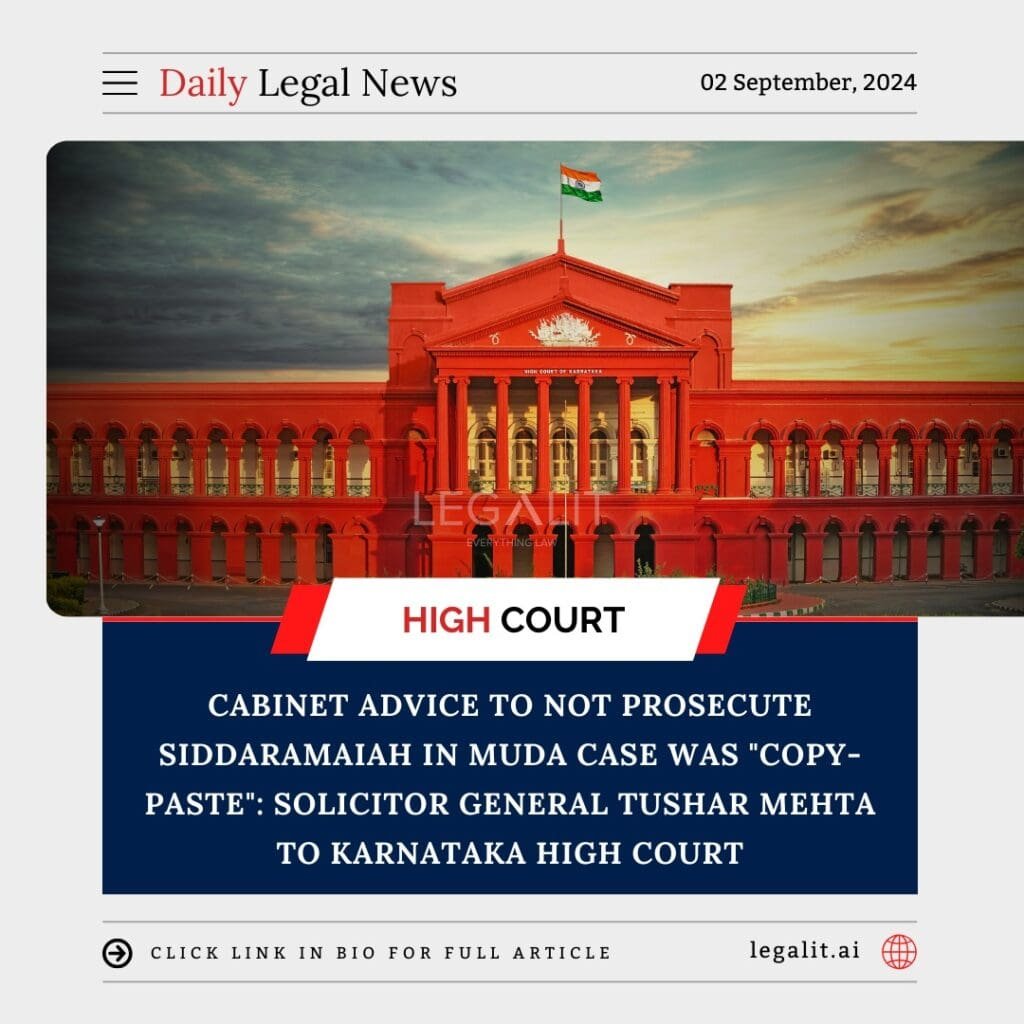
Solicitor General (SG) Tushar Mehta has made a striking claim before the Karnataka High Court, stating that the advice given by the Karnataka Cabinet to not prosecute former Chief Minister Siddaramaiah in the Mysuru Urban Development Authority (MUDA) case was a “copy-paste” job. Mehta’s assertion has drawn attention to the procedural integrity of the decision-making process within the state government, raising questions about the rationale and legitimacy behind the decision to shield Siddaramaiah from legal proceedings.
Background of the MUDA Case:
The case pertains to allegations against Siddaramaiah concerning irregularities in land allotments by the Mysuru Urban Development Authority during his tenure as the Chief Minister of Karnataka. The petitioners had sought permission to prosecute Siddaramaiah, alleging that he had violated rules and regulations in the allotment process, leading to a loss of public funds and resources. However, the Karnataka Cabinet had advised against granting permission to prosecute Siddaramaiah, which prompted legal challenges and scrutiny.
Key Points Raised by SG Tushar Mehta:
- Lack of Independent Assessment: SG Tushar Mehta argued that the Cabinet’s decision to not prosecute Siddaramaiah appeared to lack an independent, thorough assessment of the facts and allegations involved in the MUDA case. He highlighted that the advice given to the Governor of Karnataka by the Cabinet was essentially a “copy-paste” of earlier documents, suggesting a lack of original evaluation or due diligence in arriving at the decision.
- Procedural Irregularities: Mehta further contended that the manner in which the Cabinet’s advice was formulated raised significant concerns about procedural irregularities. He implied that the decision seemed pre-determined and not based on a genuine consideration of the merits of the case. According to Mehta, this undermined the credibility of the process and suggested that the decision to protect Siddaramaiah was politically motivated.
- Failure to Consider Legal Grounds: The Solicitor General emphasized that the Cabinet’s recommendation failed to adequately address the legal grounds and evidence presented in the case. He argued that the decision did not provide a reasoned explanation or sufficient justification for denying permission to prosecute, which is a fundamental requirement under law.
- Implications for Judicial Review: Mehta’s remarks underscore the potential for judicial review of executive decisions, especially those that appear to be arbitrary or lacking in transparency. He urged the Karnataka High Court to examine whether the Cabinet’s advice was a bona fide exercise of executive power or an attempt to shield a prominent political figure from legal scrutiny.
Court’s Consideration and Possible Outcomes:
The Karnataka High Court has taken note of the Solicitor General’s arguments and is expected to consider whether the decision-making process adhered to principles of fairness, transparency, and legality. The court may scrutinize the Cabinet’s advice to determine if it was influenced by extraneous considerations or if it genuinely reflected an objective evaluation of the facts.
If the court finds that the advice was indeed a “copy-paste” without proper assessment, it could potentially order a reconsideration of the request for prosecution, setting a precedent for how executive decisions are reviewed in the context of public accountability and the rule of law.
Broader Implications:
This case highlights the intersection of law, politics, and governance, especially in situations where executive decisions may appear to favor political figures. The Karnataka High Court’s ruling could have far-reaching implications for the transparency of government actions, the independence of legal processes, and the accountability of public officials. It also underscores the judiciary’s role in ensuring that executive decisions are made in accordance with legal standards and democratic principles.